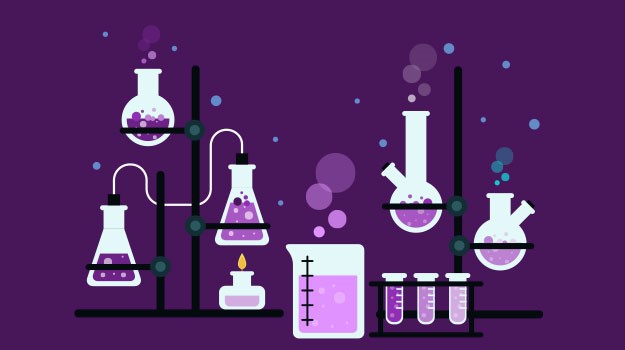CHEMICAL ENGINEERING
- INTRODUCTION
- COURSE
- CAREER OPPORTUNITIES
- COLLEGES IN INDIA
- COLLEGES IN ABROAD
- SKILL SET
- SPECIALISATION
- ROLES AND RESPONSIBILITIES
Chemical Engineering deals with the design, development of processes and operation of machines and plants through which the physical or chemical state of materials undergo various changes. Chemical engineering is a branch of engineering that applies physical sciences (physics and chemistry), life sciences (microbiology and biochemistry), together with applied mathematics and economics to produce, transform, transport, and properly use chemicals, materials and energy. A chemical engineer designs large-scale processes that convert chemicals, raw materials, living cells, microorganisms and energy into useful forms and products.

- Air Pollution Control Engineering
- Chemical Engineering Economics and Plant Design
- Chemical Process Industries
- Chemical Reaction Engineering
- Environmental Pollution Control and Safety Management
- Fertilizer Technology
- Fundamentals of Heat and Mass Transfer
- Instrumentation and Process Control
- Introduction to Electrical and Electronics Circuits
- Introduction to Numerical Analysis
- Processing
- Operations or Manufacturing
- Research and development
- Design and construction
- power production
- environmental control
- waste management and biotechnology
- Teaching
| College | Location |
| Indian Institute of Technology | Multiple Locations |
| Birla Institute of Technology | Pilani, Mesra |
| National Institute of Technology, Calicut | Calicut |
| National Institute of Technology, Silchar | Silchar |
| National Institute of Technology, Surathkal | Surathkal |
| National Institute of Technology, Bhopal | Bhopal |
| Vellore Institute of Technology | Chennai |
| Indian School of Mines, Dhanbad | Dhanbad |
| Sri Ramaswamy Memorial University (SRM) | Multiple Locations |
| Pandit Deen Dayal Petroleum University | Gandhinagar |
| St. Andrews Institute of Technology & Management | Gurugram |
| International Institute of Information Technology | Hyderabad |
| PSG College of Technology | Coimbatore |
| Maharashtra Institute of Technology | Pune |
| Anna University | Chennai |
| Rajiv Gandhi Institute of Petroleum Technology | Uttar Pradesh |
| Madras Institute of Technology | Chennai |
| Motilal Nehru Institute of Technology | Uttar Pradesh |
| PEC University of Technology | Punjab |
| University of Petroleum & Energy Studies | Uttarakhand |
| Institution | Location |
| University of Manchester | Manchester, United Kingdom |
| The University of New South Wales | Australia |
| University of California, Berkeley | United States |
| University College London | London, United Kingdom |
| Imperial College London | London, United Kingdom |
| Massachusetts Institute of Technology | United States |
| Delft University of Technology | Netherlanads |
| Harvard University | United States |
| National University of Singapore | Singapore |
| Carlifornia Institute of Technology | United States |
| University of Michigan | United States |
| University of Toronto | Canada |
| Purdue University | United States |
• An ability to apply knowledge of mathematics, science and engineering.
• An ability to design and conduct experiments,
• An ability to analyse and interpret data.
• An ability to identify, formulate and solve engineering problems.
• An ability to communicate effectively.
• initiative and attention to detail, through independent research
- Chemical engineer
• Energy engineer
• Nuclear engineer
• Petroleum engineer
• Product/process development scientist
• Analytical chemist
• Energy manager
• Manufacturing engineer
• Materials engineer
• Mining engineer
• Production manager
• Quality manager
Evaluate chemical equipment’s and processes to identify ways to optimize performance or to ensure compliance with safety and environmental regulations.
- Conduct research to develop new and improved chemical manufacturing processes.
- Determine most effective arrangement of operations such as mixing, crushing, heat transfer, distillation, and drying.
- Perform tests and monitor processes in various stages of production.
- Develop processes to separate components of liquids or gases or generate electrical currents using controlled chemical processes.
- Perform laboratory studies of various steps in manufacture of new product and test proposed process in small scale operation such as a pilot plant.
- Work closely with chemists and control engineers to ensure that the process plant is set-up to provide maximum output levels to ensure efficient running of the production facility.







